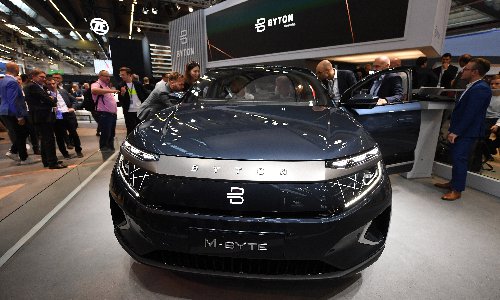SOURCE / INDUSTRIES
Chinese NEV start-up Byton suspends operations due to COVID-19 impact

File Photo: A Byton M-Byte is on display during the first press day of Germany's International Motor Show (IAA) 2019 in Frankfurt, Germany, on Sept. 10, 2019. (Xinhua/Lu Yang)
Chinese new-energy vehicle (NEV) start-up Byton has confirmed with the Global Times that it will suspend operations from Wednesday for a strategic reorganization due to the impact of the COVID-19 pandemic.
"After careful consideration and joint consultation between shareholders and management, we decided to plan to reduce costs of all employees to promote the company's strategic reorganization from Wednesday," Byton said in a statement sent to the Global Times.
Some core staff will continue to maintain basic operations of the company in the next six months, while the rest will temporarily await job reassignment, according to the statement.
"The COVID-19 pandemic has caused huge challenges for Byton's financing and production," the firm said.
Headquartered in Nanjing, East China's Jiangsu Province, Byton will have less than 100 employees remaining at its China facility, while its offices in North America and Germany have initiated bankruptcy filing processes according to local laws, per media reports.
Founded in 2017, the electric car start-up backed by state-owned automaker FAW Group and battery supplier Contemporary Amperex Technology Co (CATL) has conducted four rounds of financing worth around 8.4 billion yuan ($1.2 billion) in total.
However, its first model, M-Byte, has not yet reached mass production.
"Without a product on the market, it was expected that the company would fall amid a blizzard like the pandemic," said Feng Shiming, a veteran auto industry analyst.
Companies with small business scales like Byton cannot survive amid the health crisis, which has added woes to the already chilling auto market in China, Feng told the Global Times on Wednesday.
Tight cash flows have led to salary payment arrears for four months, according to some employees.
The company has been actively raising funds to resolve the payment issue as soon as possible, it said in the statement. "We are actively communicating with employees about the specific arrangements and will gradually arrange the payment of unpaid salaries from July."
Byton is among a slew of rising Chinese NEV start-ups called a "new force" in the market represented by NIO, Xpeng and WM Motors.
"[These three companies] have forged basic survival conditions compared to Byton based on their business scales, yet that does not mean they are safe," said Feng.
All of the new force automakers face potential risks amid the current situation, having "swords of Damocles" hanging over the heads as any external crisis could deal a heavy blow to them, he added.
Among these domestic new forces, NIO now has the highest sales. It registered sales of 10,324 vehicles in the first five months of the year, data showed.
NIO founder and CEO William Li said in the company's first quarter earnings call that NIO would see record-high quarterly deliveries reach 9,500 to 10,000 units.
As home to the world's biggest NEV market, China has in the past few years embraced the enthusiastic capital and eager participation of auto players who want to make cars different from traditional internal-combustion vehicles, but the road is bumpy especially amid the outbreak of COVID-19, which has brought many start-ups to the point of collapse.
China saw the first decline in its NEV market in 2019 when sales dropped 4 percent year-on-year to about 1.2 million units.

